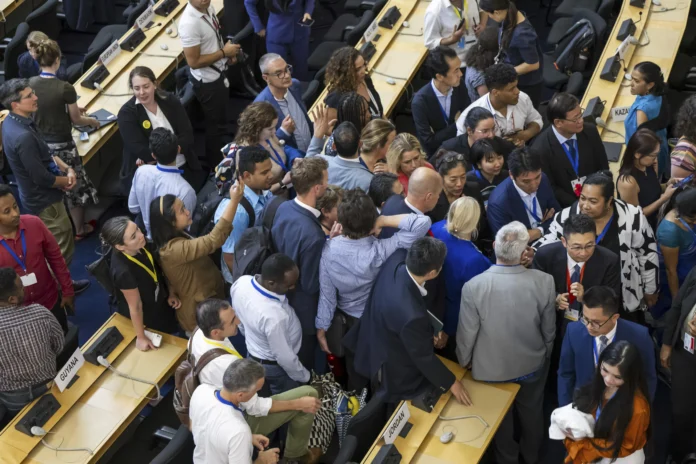Geneva, Switzerland – The world has been facing a growing crisis of plastic pollution, with millions of tons of plastic waste ending up in our oceans and landfills every year. In an effort to address this pressing issue, delegates from around the world gathered in Geneva for negotiations to reach a major treaty to end plastic pollution. However, after days of intense discussions, the talks fell apart on Friday, leaving no immediate plans to resume. This failure has devastating consequences, as it leaves no clear path for nations to collectively address the mountains of plastic that are suffocating our planet.
The negotiations, which were held under the auspices of the United Nations, were seen as a crucial opportunity to bring together countries from all corners of the globe to find a solution to the plastic pollution crisis. The talks were attended by representatives from over 180 countries, including major polluters like China, the United States, and India. The goal was to reach a binding agreement that would set targets for reducing plastic production, improving waste management, and promoting recycling.
However, despite the high stakes and the urgency of the issue, the negotiations failed to produce a concrete outcome. The main point of contention was the responsibility for reducing plastic pollution. Developing countries argued that developed nations, who are the biggest consumers and producers of plastic, should bear the brunt of the responsibility. On the other hand, developed countries argued that developing nations should also take responsibility, as they are the fastest-growing consumers of plastic.
As the discussions reached a stalemate, delegates from both sides became increasingly frustrated and tensions rose. In the end, the talks adjourned with no immediate plans to resume. This outcome has been met with disappointment and frustration from environmentalists, who have been tirelessly advocating for a global solution to the plastic pollution crisis. The failure of these talks is a major setback for the fight against plastic pollution and leaves the world with no clear path forward.
The consequences of this failed negotiation are dire. Plastic pollution is not just an environmental issue; it also has far-reaching impacts on human health, economies, and ecosystems. Plastic waste in our oceans kills millions of marine animals every year, and microplastics have been found in our food and water sources. The economic cost of plastic pollution is estimated to be around $13 billion per year, and this number is only expected to rise if no action is taken.
Moreover, the failure of these talks sends a message that the international community is not taking the plastic pollution crisis seriously. It undermines the efforts of countries that have already taken steps to reduce plastic waste and discourages others from taking action. It also highlights the lack of political will and cooperation among nations to address global issues.
However, this setback should not discourage us from finding a solution to this pressing issue. It is a wake-up call for all of us to take individual and collective action to reduce our plastic consumption and properly manage our waste. We cannot rely solely on governments to solve this problem; it is a responsibility that we all share as global citizens.
There are already many initiatives and efforts being taken by individuals, communities, and organizations to reduce plastic pollution. We need to build on these efforts and scale them up to create a significant impact. Governments must also step up and take bold actions to reduce plastic production, promote sustainable alternatives, and improve waste management systems.
The failure of these talks should serve as a catalyst for us to do more and do better. We cannot afford to wait for another failed negotiation to realize the severity of the plastic pollution crisis. We must act now, before it’s too late. Let us not forget that the fate of our planet and future generations is at stake.
In conclusion, the failed negotiations in Geneva are a setback, but they should not be seen as the end. We must continue to work towards finding a solution to the plastic pollution crisis, and this requires collective action and cooperation from all of us. Let us not lose hope and continue to strive for a cleaner and healthier planet for all. The time to act is now.

